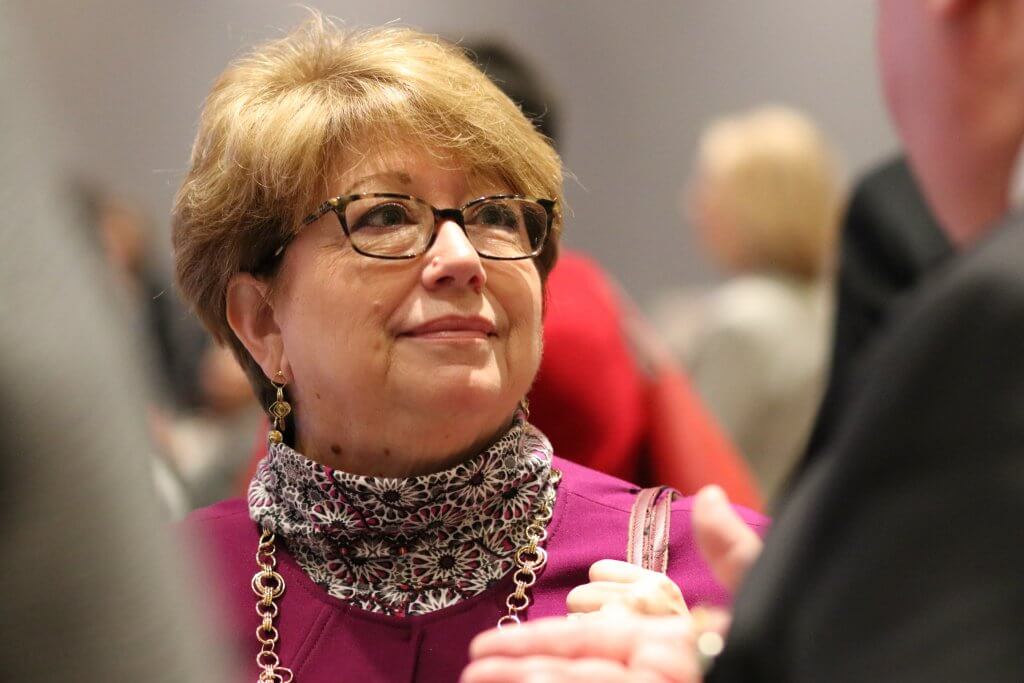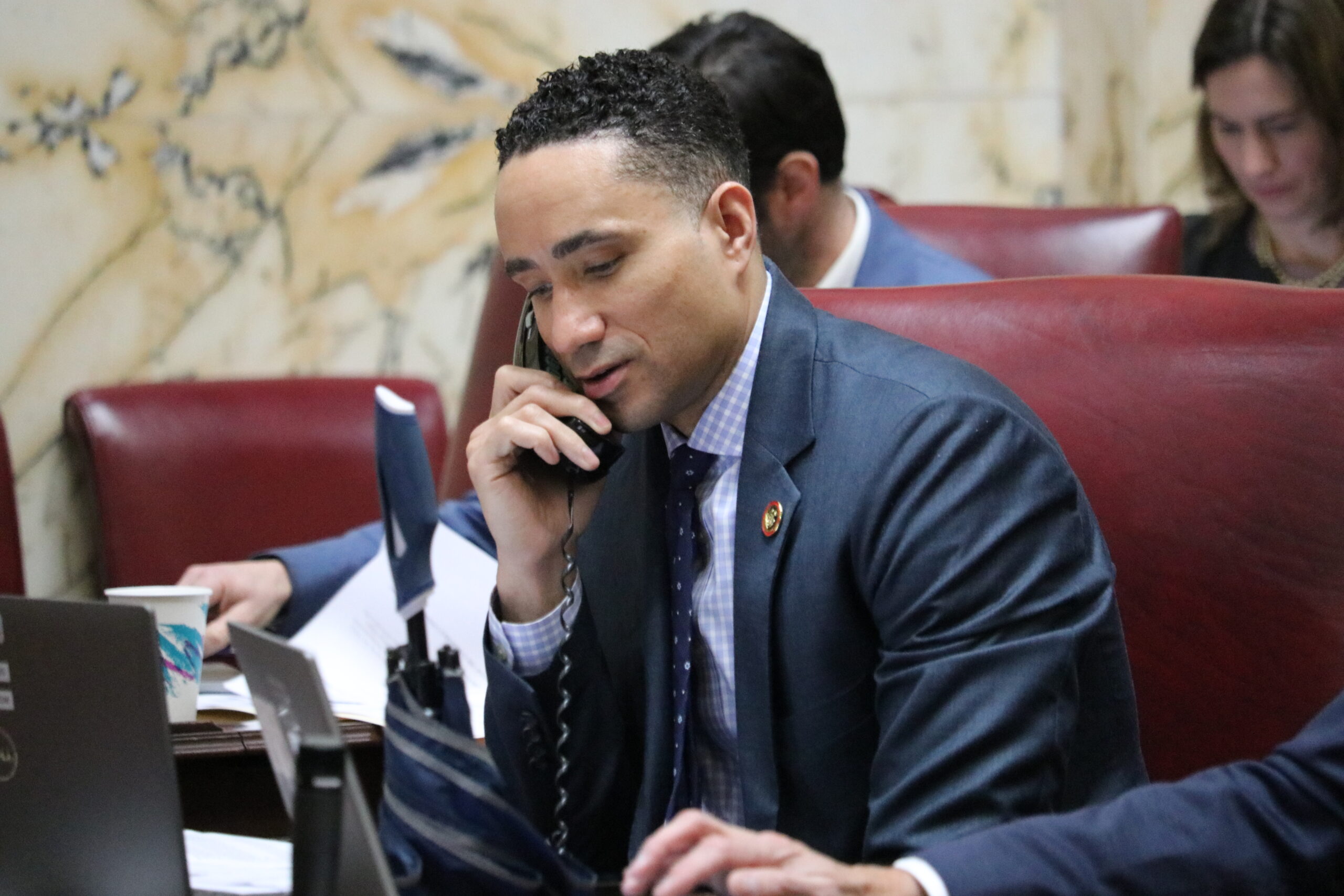Md. judiciary workgroup sets public hearing as it mulls changes in how judges are selected

As a member of his high school’s debating team in 1968, Sen. Christopher West (R-Baltimore County) was assigned to argue in favor of a proposed state constitutional amendment that, among other things, would have done away with competitive elections as the means of choosing judges for Maryland’s circuit courts.
While West’s side won the high school match, the constitutional amendment was rejected by the voters that year — and legislative debate over the issue has continued since, without resolution. “The issue of election of circuit court judges has been the subject of serious deliberation for 54 years by my counting,” West told a Maryland Judiciary workgroup last week, while wryly observing — quoting the late Yogi Berra — “I get the distinct feeling of déjà vu all over again.”
West appeared before the 21-member temporary panel — formally titled the Legislative Committee of the Maryland Judicial Council/Workgroup to Study Judicial Selection — to pitch a compromise proposal he has pushed during recent sessions of the General Assembly. The workgroup — co-chaired by Montgomery County Circuit Court Judge Kathleen Dumais and retired U.S. District Court Judge Alexander Williams, and consisting of judges, attorneys and several non-lawyers representing several advocacy groups — has held three information-gathering sessions since its creation last summer, focusing on how judges both in Maryland and other states are now chosen.
The workgroup will soon shift to deliberating on recommendations to be forwarded to the General Assembly in early 2023 on how the state’s judicial selection process — for appellate and district court judges as well as those serving on circuit courts — might be modified. Prior to those deliberations, the workgroup has scheduled a public hearing next Monday, Nov. 28, from 1-4 p.m. at the Maryland Judicial Center, 187 Harry S. Truman Parkway in Annapolis. (The hearing will be livestreamed, and those wishing to present their views can sign up to do so in-person or via Zoom by emailing [email protected])
Prior to being appointed a circuit court judge late last year — and subsequently elected to a 15-year term earlier this month — Dumais spent nearly two decades in the House of Delegates, where she advocated for getting rid of judicial elections. “At the public hearing, we’ll certainly hear some testimony as to why we ought to maintain elections. But we’re also going to hear testimony from some district court judges who are going to say ‘Here’s the reason why I’m not going to apply to circuit court’,” Dumais, a former vice chair of the House Judiciary Committee, said in an interview.
“On the circuit court, we are losing some very qualified individuals,” she added, contending that this situation arises from some attorneys being unwilling to subject themselves and their families to the rough and tumble of a process that may involve contested elections. In contrast, district court judges are confirmed by the Maryland Senate to 10-year terms with no elections involved; appellate judges likewise receive Senate confirmation for 10-year terms, and face only a “yes or no” retention vote at the ballot box when their terms end.
At the same time, Dumais has emphasized that the scope of the workgroup — for whose creation she advocated, with the support of Maryland Court of Appeals Chief Judge Matthew Fader — goes beyond the question of whether circuit court judges should be subject to election. The intent, she said, is to examine the judicial selection process in Maryland from a “holistic perspective,” telling the workgroup last week, “No one is surprised by my position on [judicial] elections, but the purpose of this workgroup — as I made clear at the beginning, as did Judge Williams — is much broader.”
For more than the past half-century, during a period spanning seven Maryland governors, a series of executive orders have created nominating commissions at the appellate and trial court levels — to vet applicants and present a list of finalists to the governor to be considered for appointment to available slots. During this time, these commissions — whose membership have often been exclusively or largely comprised of attorneys — have operated behind closed doors in interviewing and scrutinizing those seeking judicial appointments.
In its information gathering sessions to date, the workgroup has heard presentations from two organizations focused on reform of the judicial selection process — the New York-based Brennan Center for Justice and the Denver-based Institute for the Advancement of the American Legal System (IAALS), both of which have advocated for a judicial nominating process that is more public. In a presentation to the workgroup earlier this fall, John Kowal, a vice president of the Brennan Center, said his organization has embraced reforms that “pay a lot more attention to who participates in the independent nominating commissions.”
Under these reforms, Kowal said, “It wouldn’t be acceptable that there isn’t gender diversity, that there isn’t racial diversity, that there isn’t community participation.”
As it begins its deliberations on possible modifications to the status quo in Maryland, the workgroup faces the task of balancing such recommendations with concerns that a more public vetting process might serve as a disincentive for some applicants for judgeships — much as the need to face the electorate currently is viewed as discouraging others.
While saying that she personally lacks any “large concern” about how the state’s trial court nominating commissions now operate, Dumais did add during last week’s interview, “That’s something that I think we should look at…based on the presentations by the IAALS and the Brennan Center for Justice [that] talk about making sure that the trial court nominating commissions are viewed as transparent and fair and representative.”
Another politically fraught topic before the workgroup is whether to institute a performance evaluation process for incumbent judges in Maryland. Such a system has been advocated by both the Brennan Center and the IAALS and is in place in a handful of states, such as Colorado.
“I do want to…have the workgroup look a little deeper into the judicial performance evaluation,” Dumais said, noting, “Something I’ve heard repeatedly over the last 20 years during the legislative process was ‘There is no evaluation of judges’.”
She suggested that if competitive elections for circuit court judges are done away with and replaced by retention votes, “then we need to be able to provide the public [with] access to some sort of performance evaluation process, and a repository where they can go to get the information.” (West, in his appearance before the workgroup last week, dismissed the current retention election process as a “charade…because no judge has ever even come close to losing a ‘retention’ election.”)
As Fader noted in opening the first session of the workgroup in September, Maryland’s original constitution of 1776 called for all judges to be appointed. A new state constitution adopted in the pre-Civil War era in 1851 turned all judgeships into elected positions, with the hybrid system now in place subsequently evolving.
This was consistent with national historical trends in judicial selection, as outlined by Kowal of the Brennan Center at the September workgroup session. By 1909, 36 states had moved to the popular election of judges in a reaction against the appointment system of the early years of the republic. But, Kowal continued: “That yielded its own problems. People saw it was the party bosses who controlled who even got on the ballot, so the idea of the people’s choice was illusory.”
In turn, he said this led to a push for so-called “merit selection” first proposed in 1913, but not adopted until 1940, in Missouri. Thirty years later, a Maryland variation came about when Gov. Marvin Mandel (D) became the first state chief executive to adopt the current system of judicial nominating commissions to vet candidates prior to appointment.
West’s compromise proposal, which he hopes will “cut the Gordian knot that has tied up the General Assembly for 54 years” on the issue of elections for circuit court judge, was developed with then-Del. Erek Barron (D-Prince George’s), now the U.S. attorney for Maryland. It would create a threshold in which a candidate for circuit court judge who is appointed by the governor and receives a vote of 80% or more of the Maryland Senate would be seated without an election — while someone who received between 50% and 80% would be compelled to face the voters.
West told the workgroup that, given the track record over the past quarter of a century, “it seems quite likely that nearly all of the gubernatorial nominations to the circuit court” would surpass the 80% threshold. But he contended that, over a period from the 1970s to 1990s, some governors had “ignored the legitimate judicial aspirations” of both Black and Republican attorneys. Given the current composition of the Maryland Senate, Black or Republican members would be able to band together to block a nominee from achieving the 80% threshold and force a judicial election — in order to hold “future governors’ feet to the fire,” as West put it.
In an interview after his workgroup presentation, West said he intended to reintroduce “some form” of the compromise plan — last co-sponsored with Barron in 2020 — during the legislative session that begins in January. During last week’s work group session, Dumais and a couple of other members expressed concern that West’s plan — as now crafted — would impede confirmation and seating of judges when the General Assembly was not in session for nine months a year, creating backlogs for judicial dockets.
At the same time, Dumais acknowledged “there appeared to be support” for West’s compromise from among members of the workgroup, adding that “the logistics have to be talked through, and maybe there are tweaks that would make this work. I appreciate the research that’s been done by Sen. West.”
West’s proposal would require a state constitutional amendment subject to a voter referendum — as would some of the potential changes that the workgroup will soon begin discussing in earnest. After Monday’s hearing, the workgroup has two meetings scheduled for December and one in early January. “The plan for moving forward is to have at least an interim report in January that we would then present to the legislature.” Dumais said.
While the tentative schedule calls for the workgroup to brief legislative committees of jurisdiction on findings and recommendations during the 2023 session, there are no plans to try to craft legislative language on those this year, according to Dumais. That would wait until 2024, when it could be placed before the General Assembly for a vote and, if passed, placed on the November ballot.
.Asked whether she feels that the workgroup exercise — the first major effort in more than two decades to assess the overall judicial selection process in Maryland — could end in stalemate, Dumais quietly chuckled and replied, “I’m the eternal optimist and always have been — and really do believe we are going to be able to find some consensus.”
“Do I think there will be some dissent or areas of disagreement? Yes,” she said, an allusion to the effort to include a variety of viewpoints — particularly on the need for judicial elections — when the workgroup was created this past summer. Nonetheless, Dumais predicted: “We’ll come to some consensus — recommendations to the new governor as to ‘Here’s what we think would make sense for the composition of any judicial nominating commission.’ And we’ll battle out what we think ought to happen with elections.”




 Creative Commons Attribution
Creative Commons Attribution